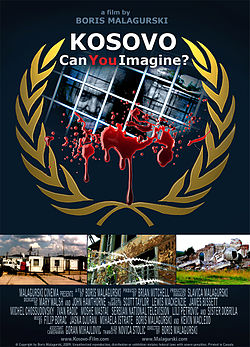| Kosovo: Can You Imagine? | |
|---|---|
 Official poster | |
| Directed by | Boris Malagurski |
| Written by | Boris Malagurski |
| Produced by | Brian Mitchell |
| Starring | Lewis MacKenzie James Byron Bissett Michel Chossudovsky |
| Edited by | Boris Malagurski |
| Music by | Filip Borac Mihaela Cristina Istrate Kevin Macleod Boris Malagurski |
Production company | |
Release date |
|
Running time | 30 minutes |
| Country | Canada |
| Languages | English Serbian Albanian |
Kosovo: Can You Imagine? is a 2009 documentary film directed by Serbian Canadian Boris Malagurski about the plight of Serb communities living in Kosovo at the time the documentary was filmed. Former Canadian general Lewis MacKenzie, former Canadian diplomat James Byron Bissett, former UNMIK officer John Hawthorne and economist Michel Chossudovsky appear in the film.